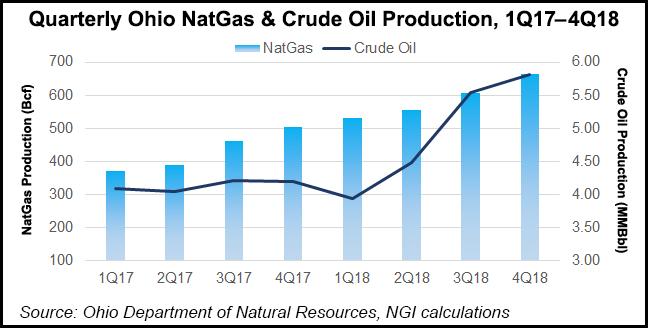Ohio Agencies Say They Don’t Get Many Fracking Health Complaints
by Nicole Jacobs, Energy in Depth


Claims of health impacts from shale development have become a heated topic in the Appalachian Basin, with activists pushing a misleading narrative in the region. But the allegation that fracking is causing widespread public health issues is far from reality in the Buckeye State, according two state agencies.
In response to a handful of activists soliciting information on households living near shale development in an attempt to create an agenda-driven health registry, the Ohio Department of Health said it does respond to each complaint received about the shale industry. As Rebecca Fugitt, assistant chief of the department’s Bureau of Environmental Health and Radiation Protection told StateImpact though, regulators simply aren’t getting many complaints:
“No, we only get, maybe… it’s less than five a year…to be honest, it really is. We don’t get very many.” (emphasis added)
Similarly, the Ohio Department of Natural Resources received only 10 health complaints over 11 years from citizens living near oil and gas operations.
Nonetheless, activists led by the Heinz Endowments-funded Southwest Pennsylvania Environmental Health Project traveled from places like Dayton, Oberlin, Cleveland and Lake County – where there is little to no shale development – to solicit information from people living near Youngstown on their medical ailments in an attempt to link them to nearby shale development.
Numerous studies debunk activist fearmongering.
The low number of complaints is underscored by numerous studies that have found Ohio’s oil and natural gas industry is not having negative impacts on groundwater or air quality that could lead to health impacts.
Multiple peer-reviewed studies have found that the industry is not impacting groundwater in the region, including research from the University of Cincinnati. UC has spent hundreds of thousands of dollars to study the potential air and groundwater impacts of fracking. Despite utilizing multiple research methods, its researchers found no health issues attributable to natural gas extraction.
“We found no relationship between CH4 concentration or source in groundwater and proximity to active gas well sites.”“… our data do not indicate any intrusion of high conductivity fracking fluids as the number of fracking wells increased in the region.”
In addition, despite increased development, Ohio is spearheading nationwide carbon emissions reductions. Ohio had the highest reductions in the nation – a whopping 57 million metric tons (MMT) total and 50 MMT emissions from electricity generation – from 2005 to 2015.

Ohioans are seeing the benefits of industry growth.
The Buckeye State continues to set new natural gas production records, boosting economic activity in the region. During the fourth quarter of 2018, Ohio produced 663.5 billion cubic feet of natural gas –marking a new state quarterly production record and a nearly 32-percent rise over the same period in 2017.

This staggering growth is having a direct impact on the local economy, providing thousands of high paying jobs. Ohio Oil and Gas Energy Education Program Executive Director Rhonda Reda recently explained:
“In 2011, our industry employed around 14,000 Ohioans, and today that number has dramatically increased to nearly 200,000, thanks to the ongoing development of the Marcellus and Utica Shale formations. As a result, workforce development remains a priority for our industry.”
The statements from ODH and ODNR pushing back on activists’ attempts to create a false narrative confirm that Ohio’s shale industry is bringing benefits to residents across the state, while protecting the environment and public health. And while it is important to continue to evaluate potential health impacts, the claims being made by activists simply aren’t a reality in Ohio.


